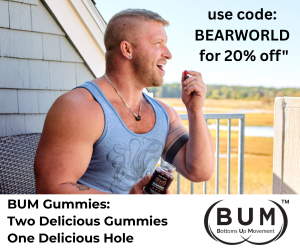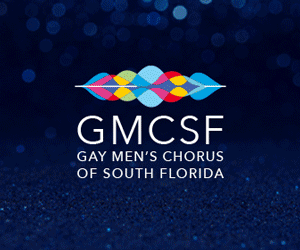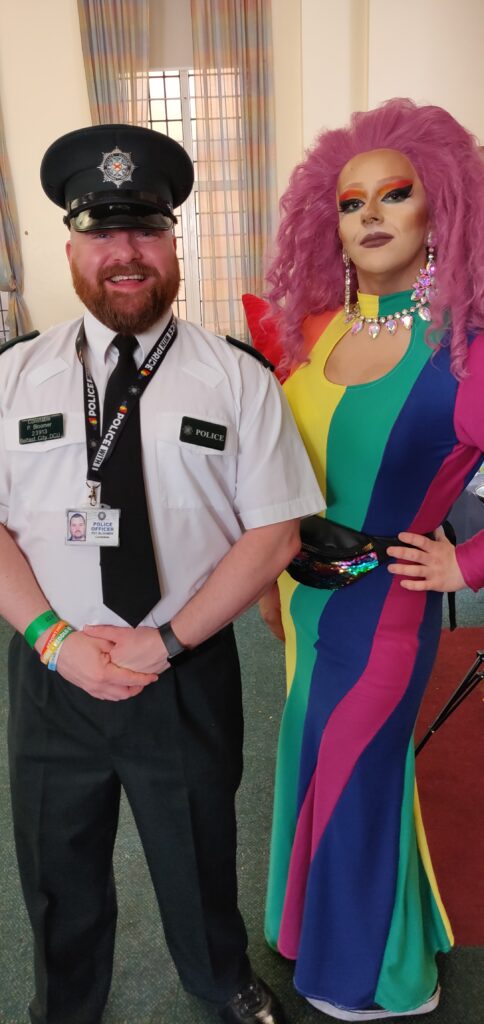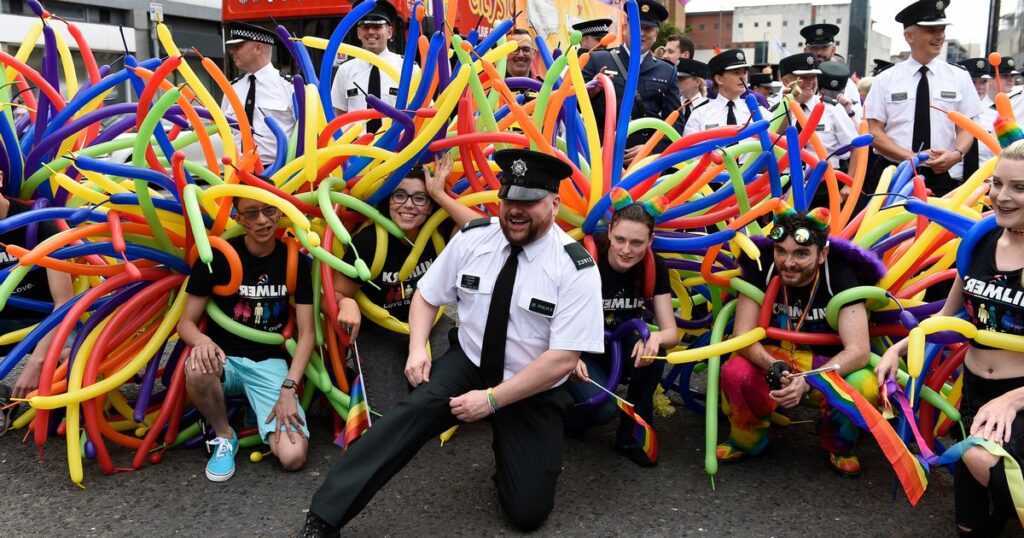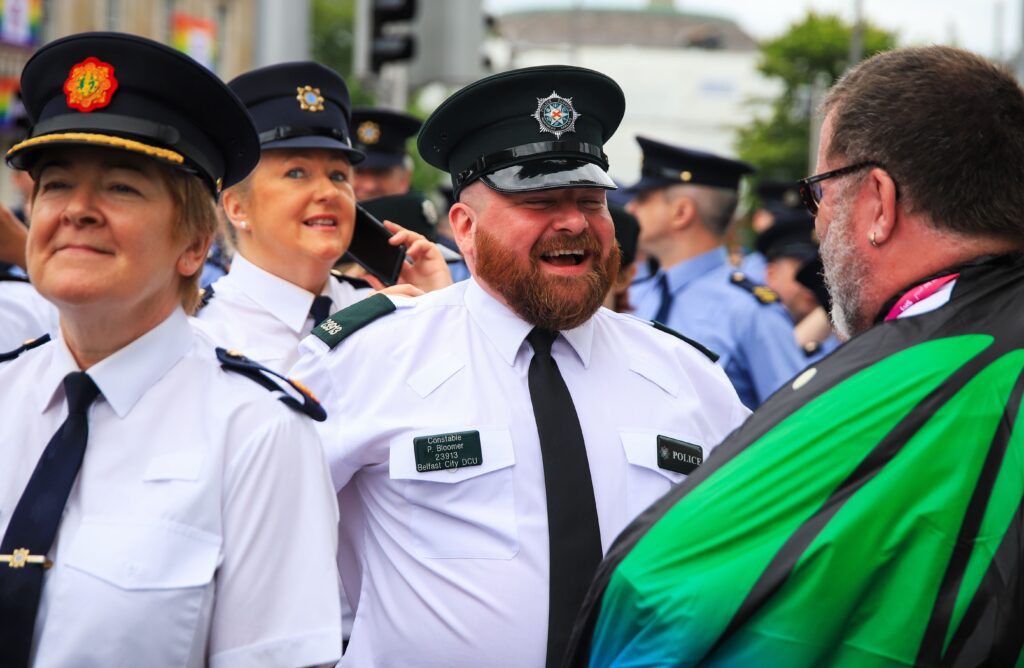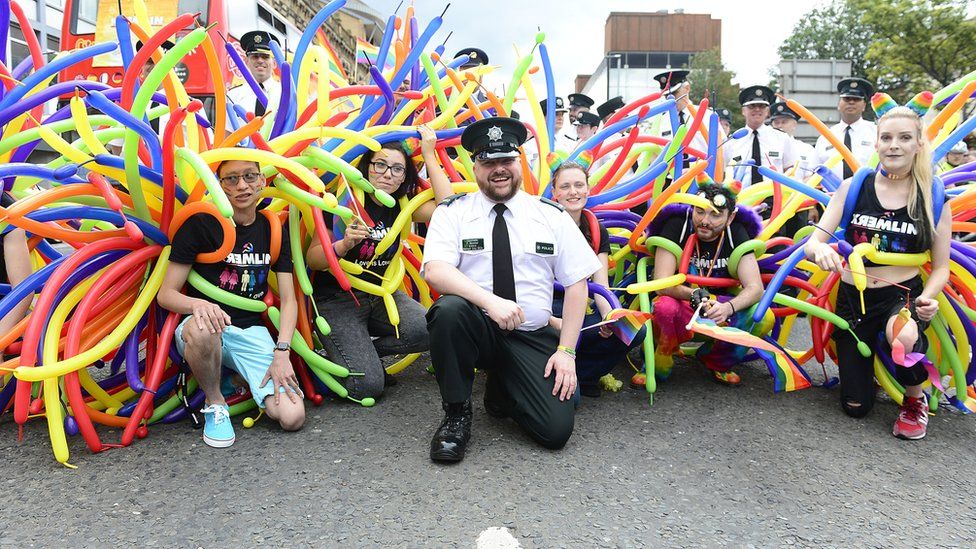
Queer Northern Irish Officer Paul Bloomer talks representation, launching Intersectionality Working Group
Northern Ireland is gradually emerging as a more accepting place for LGBT+ people in the United Kingdom, especially after the legalization of same sex marriage in the country early last year. But, in many other countries throughout Europe, Northern Ireland is still known as one of the most homophobic places in Western Europe.
The recent strides toward equality have empowered the large and diverse queer community of Northern Ireland, despite its reputation. But the history of inequality still weighs very heavy on the lives and stories of the queer people of Northern Irelnad. This is the reason why Constable Paul Bloomer has decided to take a stand.
Paul Bloomer left Northern Ireland in 2002, like many young LGBT+ people in the country who “went away to be gay.” After seeing an advertisement for United Kingdom police recruiting while living in England, Paul decided to return to Northern Ireland, as there were not many out LGBT+ police officers there. Visibility is important, and Paul knew that his community needed him.
Paul’s many experiences with discrimination and marginalization as a queer identifying person has allowed him to greater empathize with other groups of people who share similar experiences. After hearing the cries of groups such as Black Lives Matter, and other groups around the world calling for police to do better, he knew that he needed to act.
As part of the National LGBT+ Police Network, the representative body for LGBT+ police officers in England, Wales, Northern Ireland and the Channel Isles, Paul has helped to launch the new Intersectionality Working Group (IWG). Being led by Black, Asian and Ethnic Minority people within the national and regional networks, this group aims to improve representation and inclusion within the NCG.
I spoke with Paul recently about what led him to create IWG, and how he plans to amplify the voices of LGBT+ and Black, Asian and Minority Ethnic people both in the United Kingdom and internationally.
Kyle Jackson: How long have you been working with the police force in Northern Ireland?
Paul Bloomer: I’ve been in the Police Service for 11 years now and worked in a variety of roles. I love being a police officer, as a large part of my job is all about helping people. I get real satisfaction out of my work and one of the most fulfilling things for me is delivering criminal justice outcomes for victims of crime.
It’s really important that people who suffer crime are supported and that we police officers do everything we can to help them get justice. We can’t solve every crime but we can do our best. To me the most important thing is that the victim knows I care and that I have done everything possible to help them.
I would like to say to anyone reading this that if you have been the victim of crime, please report it. Police can only act on the information we receive so it’s really important that we get those reports from the public. Give us a chance to do something about it.
KJ: You stated that you have experienced discrimination within Northern Ireland society. Does this include the police force? Can you tell me about your experiences?
PB: I was raised by parents that came from opposite sides of the community divide in Northern Ireland and I grew up in the most violent years of the troubles. My parents were a bit of a love across the barricades story, and how they were treated by society affected how they brought me and my sister up.
We were raised in a very different way to most people in Northern Ireland who belonged to one community background or the other. This set me and my sister apart from other kids when we were younger, as we both have a shared Irish and British identity, and we were sometimes ostracised for this. As a lot of people had a very binary view of the conflict here in Northern Ireland and could only see the world through the lens of ‘them and us’, so people that didn’t fit that view were often marginalised, as the idea of a shared identity with both sides of our conflict was very unusual at the time.
Thankfully now it’s much more common. My parents are amazing people who instilled in us a deep respect for diversity, a strong desire for public service and also for social justice. They raised my sister and I to be solution-driven, positive people and to try and make the world a little bit better as we pass through it. They didn’t want us to grow up and be a part of the cycle of hatred that had kept our conflict going for 40 years.
I love the idea of helping people in society and standing up to protect people’s rights, so for me the idea of being a police officer seems like a natural choice. However, I thought the policing institution wouldn’t be welcoming of LGBT+ people. I was outed in school at 14 and suffered homophobic bullying throughout my school life. This made life almost unbearable, and it didn’t help that teachers in the school would turn a blind eye. I felt like I was the only LGBT+ person in the world.
When I was 15 I sat down with my career’s advice teacher, and he asked me what I wanted to be. When I told him that I wanted to be a police officer, he laughed and told me the police wouldn’t be interested in someone ‘like me’; My dream job wouldn’t accept me because of my sexuality. I was absolutely distraught, as I thought what I really wanted to do in life was being taken away from me because of who I was. This left me feeling dejected and resentful.
I withdrew from mostly everything in school. I became disinterested in my studies and dropped out with very little in the way of qualifications. Back then, Northern Ireland wasn’t the most tolerant of places, so there was not a lot of acceptance for LGBT+ people. When I was 16, after the Belfast Pride parade, I remember that shops and cafes wouldn’t let me in because I had a rainbow flag over my shoulders.
IGLA have called Northern Ireland the worst place in the UK for LGBT+ rights and LGBT+ rights Campaigner Peter Tatchell called Northern Ireland the most homophobic place in Western Europe. Leading mainstream politicians and religious leaders would frequently compare LGBT+ to paedophiles and spout hateful misleading things about us.
I left Northern Ireland in 2002, like many young LGBT+ people did. I’ve heard a phrase a lot of LGBT+ people who left Northern Ireland say, ‘We went away to be gay’. These experiences of marginalisation have allowed me to greater empathise with other groups of people who have similar experiences of marginalisation and discrimination.
I was in London in late 2008 when I saw an advertisement for UK Police recruitment in an LGBT+ Magazine, seeing this was like a light bulb going off in my mind. I felt ‘seen’; The thing I had always wanted to do was available to me. The Police were looking for people like me to join. This made me feel like my life’s ambition was possible, and that someone like me would be accepted in the job.
I initially thought about staying in England, but a talk with a good friend convinced me to return to Northern Ireland as there were not many visible LGBT+ police officers in Northern Ireland at the time. I felt if I went home I could work to drive positive change for everyone in Northern Irish society from within the Police Service and stand up for my community and other marginalised groups.
I returned to Northern Ireland and I have since tried to be a positive role model for LGBT+ people in my home country. Things are much better here now in Northern Ireland for LGBT+ people — we have finally gained equal marriage in 2020, and I’m still optimistic things will continue to improve.
I’m fortunate that I have not directly experienced homophobia within the Police Service and I feel accepted with my work. However, I fully acknowledge that there is always more work to do for policing to be truly inclusive.
Also, while there is homophobia, transphobia and racism in our society, we will continue to see it reflected within all of our institutions. It is up to all of us in society to ensure there is no place for hate and that we do all we can in our spheres of influence to drive out hate and create an environment where everyone can be their true authentic self without fear of experiencing discrimination. I do that by standing up against racism, homophobia and transphobia in the institution I belong to, and by trying to empower and support other marginalised people within the whole of Policing beyond my home service.
People from marginalised backgrounds within Policing recognise the need for change, to make any sort of progress, we absolutely need the support of the communities we come from. I understand the real anger, mistrust and hurt there is out there but I want everyone to know that there are those of us within Policing who are doing all we can to make our institutions better for everyone.
That can be tough and the support of our communities is essential, even if you have no confidence in Policing please try and support those officers within the Policing Institution who come from your communities. It can be lonely standing in a room full of people who have never experienced marginalisation, trying to make them understand you, knowing that your community is behind you is crucial and massively empowering.
I know across the world there are increasing calls to ban police from Pride parades. I believe the Police officers who march in pride can be part of the solution, and they are the people who are standing up for minorities within policing institutions. Marching in pride for me isn’t about the police dominating an LGBT+ Pride event, for me it’s about claiming the uniform I wear for me and for my community. It’s about bringing my identity as an LGBT+ person and a police officer together and being seen by my community. It’s about showing the community that there are people like them in the Police service and that we stand with our communities in solidarity.
Also, it’s about being visible and showing those within policing who may not hold the positive values of equality, diversity and inclusion that there are empowered people who will stand up for those values and that their communities are with them. That’s a powerful symbol to present and one I believe can drive positive change. I believe that banning Police from Pride can be counterproductive, as it disempowers those officers who hold those positive values and empowers those who don’t.
Being a police officer in Northern Ireland is very different to a lot of places in the world. Due to the conflict in Northern Ireland and our peace process, Policing had to change from being a highly militarised force to being something focused on protecting communities with a stronger focus on upholding human rights. Almost everything about our policing institution changed from the uniforms, which was very symbolic, and the name, from Royal Ulster Constabulary to Police Service of Northern Ireland, to more substantial changes such as fundamentally rebuilding how Police officers are trained.
I’ll never forget the first lesson I was ever taught in Police college was Human Rights. Recruitment was outsourced to an external body and positive discrimination for the main minority community in Northern Ireland was implemented to change the composition of the service to make it more representative of the community.
Part of changing the composition was giving those who didn’t want to be a part of a new Police Service the opportunity to leave the service without penalty, and this greatly helped to shift the organisation’s cultural makeup. Police Service Northern Ireland is the most accountable police service in the world with multiple layers of civilian oversight and community partnership working bodies. This is enshrined in legislation and we are held to account by our Policing Board, a civilian body made up from the community and elected politicians.
We also have the Police ombudsman, a completely separate impartial institution whose job it is to ‘Police the Police’. Our code of ethics puts a positive obligation on individual officers to report wrongdoing. If we observe our colleagues doing something abusive or illegal and don’t report it, then we would face misconduct proceedings and likely criminal proceedings as well as them.
We are not perfect, not by any means, but how we work is significantly different to how policing works elsewhere in the world.
KJ: How does the Intersectionality Working Group plan to amplify the voices of LGBTQ+ people of color, both in Northern Ireland and internationally?
For me setting up this group was very much a response to the BLM protests we saw sweep across the world. To hear Black, Asian and Minority Ethnic (BAME) people the world over call for their Police services to do better was a real wake up call for me. It forced me to look at myself and ask, ‘am I doing everything I can to make Policing better for BAME communities?’ The answer did not come easily to me and it caused me a great deal of introspection.
I sit on the UK National LGBT+ Police Network board, I looked around, during one of our meetings and all of us were white with the voices of BAME people not present in our decision making. While we as a National Network hadn’t deliberately excluded people from BAME backgrounds, we hadn’t made an effort to proactively include people and make our group reflective of the communities we serve.
I proposed setting up an Intersectionality Working Group and the rest of the board were supportive. I reached out across the whole of the UK to put together this group. While I helped set it up, I knew that going forward, for the group to really help us drive positive change, it had to be led by LGBT+ people from BAME backgrounds.
I knew it had to be authentic and driven by the people who are affected by racism and have that lived experience of intersectionality. If it wasn’t led by BAME people this would be an exercise in ‘window dressing’, and that is not what this is about. It’s about doing what we can to deliver the positive change BLM protesters were asking for.
The group is now Chaired by Dionne Johnson of Staffordshire Police and Constable Laks Mann of London’s Metropolitan Police, with me staying on in a supportive role. The group isn’t just for Northern Ireland, it is UK wide and has dozens of officers from a range of ethnic and intersectional backgrounds.
What I hope we do is to empower BAME LGBT+ people by improving visibility by having prominent visible Black, Asian & Minority Ethnic LGBT+ role models profiled and by using our platforms and communication channels to tell their stories and the stories of other marginalised people. People can’t shine if you stand in their light, but you can hold up a mirror and help them shine brighter and be truly seen.
I believe that being ‘seen’ is really powerful and I want to help support and empower my BAME LGBT+ colleagues to be truly seen, heard and understood with true inclusiveness. I hope that this will lead to LGBT+ BAME communities seeing themselves reflected in Police Services and that would hopefully lead to greater partnership working between communities and Police. I believe this will help drive the positive change within Policing that we all want to see and deliver a better service for everyone in society.
If anyone who works within UK Policing would like to get involved please email me paul.bloomer@psni.police.uk.
Follow Paul Bloomer on Twitter.


